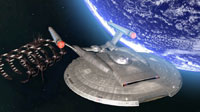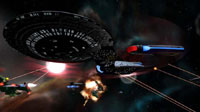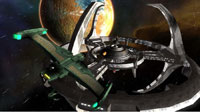

Star Trek Legacy Review 242
Since late last month, I've been playing with the Xbox 360 title Star Trek Legacy. The fact that it is not a great game should be no surprise. Despite some entertaining plot elements, the title's gameplay leaves a lot to be desired. What is confusing, and troubling, is that this is just the latest in a long line of disappointing Trek games. Looking back on the history of Star Trek gaming, games like Elite Force or A Final Unity stand out from a disturbingly large field of titles that over-promise and under-deliver on the well-loved Trek universe. Why is it so hard to make a good Trek game? Why do developers keep trying and failing? Why is there a Vulcan leading the Borg? Read on for consideration of each of these questions, and a review of Star Trek Legacy to boot.
- Title: Star Trek Legacy
- Publisher: Mad Doc Software
- Developer: Bethesda Softworks
- System: 360 (PC)
As so often happens with a Trek title the premise, at least, is compelling. Commanding a task force of up to four ships, you follow a fairly coherent plot from the "Enterprise" era all the way through to the time of Jean-Luc Picard and Benjamin Sisko. You can choose between a number of ship classes to include in your fleet, and gameplay consists of real-time ship-to-ship battles. The actors who portrayed the captains in the various eras make a return, offering their vocal talents and a feel of authenticity to the proceedings.
What sounds like a can't-miss formula, though, inevitably flies past the target at full impulse. Ship and fleet control is the most notable failure, and results in individual combat moments requiring more effort than feels right. I found fleet combat most frustrating, as it is so variable how your actions are interpreted. When you begin a mission, all four of your ships are taking orders from you at the same time. Selecting a enemy for combat (by hitting the right shoulder button and cycling through the available options) is intuitive and quick. When all four ships are following your orders, this results in a focused barrage that effectively neutralizes targets. The problem comes when ships begin 'thinking' on their own.
It was never clear to me what prompted this, though I know that giving individual ships orders via the overhead tactical display (available via the 'select' button) always 'broke up' the fleet's command. This is problematic, as the 2D overhead display is the best way to keep track of the action on the sometimes dauntingly large 3D space maps Legacy uses. Indeed, the z-axis is used in the game (unlike in the show), making it hard to keep track of enemy ships on occasion. These are challenges, though, to be overcome: the frustration sets in when order-less ships choose to sit dead in space and absorb phaser hits without retaliating. That's some extremely poor decision-making on the part of the AI, and can mean the difference between success and failure in a large and frantic naval battle.
Another, subtle frustration is the pathing your friendly ships use when circling a target. While sometimes ships do 'the right thing' and orbit their prey at an appropriate range, trying to keep weapons locked on the target at all times, that's not always a given. Often, ships locked onto a target attempt something I can best refer to as a 'strafing run', where they move directly at a target, allowing firing on the enemy for a brief period of time, before overshooting and swinging around for another pass. Overshot on targets can sometimes be quite some distance, resulting in a long delay between assaults on enemy ships. This style of attack is particularly frustrating when attacking immobile targets like space stations and asteroids, as AI-controlled ships tend to fly right into their prey and sort of bounce off. Given the finicky targeting you're allowed to use, this greatly reduces an AI-controlled ship's effectiveness against such a target. In a pitched battle, which is almost all of them, it just becomes frustrating to have to keep so many balls in the air.
That's a shame, too, because combat is actually a lot of fun when things are moving in the right direction. It's extremely easy to jump from ship to ship within your fleet, simply by pressing one of the four directions on the D-pad. This can (generally) allow you to keep all four of your ships active and flying straight. Weapon use is as simple as right trigger for phasers, left for photons. The game does a good job of informing you when weapons can be used, both via visual HUD elements and vocal alerts. Legacy also does a great job of switching up who you're fighting, and what exactly you're doing in combat. Sending away teams onto a space station in the middle of a pitched battle, for example, or using a sensor scan to detonate an explosive keeps you on your toes and stops things from getting overly monotonous.
The plot that strings these combat elements together is all the Trek you can stand, and more, crammed into a disappointingly short timespan. There is time travel, Klingons, Romulans, Borg, and one very weird Vulcan. The plot itself is explained in detail in a comic included as an 'extra' on the game's main menu. To give you a horrible taste, it mentions V'ger, from the first Star Trek movie, in connection with the Borg's origin. Looking back on the whole story from the last mission gives you an 'ohhh' moment, but it's not that great a payoff for the amount of time you spend in the dark. Just the same, overall the story is coherently told and entertainingly written. The dialogue written for the captains is especially entertaining; even the stuff written for Shatner (who, predictably, gets the most 'screen time') is enjoyable in a scenery-chewing kind of way. Getting to hear Avery Brooks intone new lines as Benjamin Sisko was especially enjoyable, and the role DS9 gets to play near the game's end allowed me to forgive a lot of smaller oversights.
Visually, Legacy is a competent 360 title. It's certainly not Gears-pretty, but the ships are all well modeled, and it's hard to make space look ugly nowadays. Ships and stations explode nicely, though larger objects tend to look a little odd when breaking apart. Audio effects use official FX from the show, and the score consists of forgettable Trekesque tracks that back the game's sometimes-tense moments adequately.
Star Trek: Legacy, then, allows the dedicated Trek fan to experience ship-to-ship combat in a way that's never quite been captured so well before. Trekkies are sure to appreciate that new experience, as well as the vocal work of the actors-turned-captains. As a game, though, Legacy leaves a lot to be desired. Gamers are going to find the inexact fleet control and inept AI frustrating, with some missions being bang-your-head-against-the-desk annoying. The first Next Generation-era mission, Revelations, is particularly hair-pulling, and makes the lack of in-level save points sorely missed. If the lack of a new Trek show on TV is leaving you anxious, I would readily recommend Legacy as a balm to your Trekkish needs. Likewise, the game might be worth a rental of you're a 360 gamer who has already tired of Gears of War. It's just not that great a game otherwise, and can readily be given a miss for other, better games.
This leaves us with the question I posed above, though: Why is it so hard to make a good Star Trek game? It could be the difficulty of making licensed games satisfying to players outside of the 'fan' population ... but Star Wars titles like Knights of the Old Republic and Jedi Academy transcend fandom as truly great gaming experiences. Heck, even Spider-Man 2 is a better game than any Trek game I've played, and Spidey's history with gaming is a lot shorter than Star Trek's. Given the dialogue and narration-heavy storytelling that Star Trek uses, it is possible that the Trek universe just isn't a good fit for videogames? What does the lackluster performance of these latest Bethesda titles mean for future trek games? Star Trek Online, specifically, seems to have a Herculean task before it. How do you bring a license that's never seemed to be quite right for gaming to one of the most finicky of all genres, the MMOG?
What do you think? What would it take to make a great Trek game? Are there any Trek games that you think have really succeeded? What will Star Trek Online need to include in order to satisfy you?



"Why is it so hard to make a good Trek game"? (Score:5, Interesting)
Tension is created through plot devices and not physical violence.
And because Trek is about large (non-nimble) vessels.
Add fast action and its no longer "Trek".
Keep it "Trek" and it's just not that fun as a video game.
i don't get it (Score:3, Interesting)
What's odd is that it is possible to make a good, licensed game. Take KOTOR for xbox, as an example.
However, most studios seem to see a content license as a "get out of work free" card, and expect that the game will sell on name recognition alone, regardless of whether or not it's any good.
Action & Adventure vs Philosophy (Score:5, Interesting)
In short, if you want a good Trek game they're going to need to switch game genres to match the show genre more closely.
Dialogue and narration heavy videogames (Score:5, Interesting)
That's not the problem. As the submitter mentioned himself, although most Trek games are horrible, there were some winners, such as A Final Unity. It might, however, restrict it to some genres. You take the Star Trek universe, and make a game where you just take ships back and forth and shoot at each other, and you're eliminating 90% of what makes trekkies like Trek. I can say the same thing about making a shooter out of it, which is why I for one didn't like Elite Force.
The problem is that no one seems to like adventure games anymore. Why can't we have more games like Judgment Rites and Final Unity? Star Trek episodes, although they do contain some action which should not be ignored, are mostly about solving puzzles and making choices that influence the outcome of some event. That's what gamers do in adventure games, and that's why every trek gamer remembers A Final Unity as being so great.
Super Star Trek? (Score:2, Interesting)
God I loved that game from the moment I checked out the floppy from the local library...
The best Trek game (Score:2, Interesting)
Re:The best Trek game (Score:3, Interesting)
Give me BOTF with tons of side-missions (maybe patterned off of real Star Trek episodes like "The Chase"), and I'd be a happy camper.
Trek ships are wrongly represented (Score:2, Interesting)
Can anyone name a good naval game where you controlled destroyers and battleships? There are next to none and what do exist are almost always bad.
What i think could do a good Trek game for naval combat would be to focus on the more "fighter"-types ships of the latest shows. We would have more fun maneuvering some kind of shuttle that can only fire in front of itself than maneuvering a huge and slow ship that can fire anywhere it faces because the guns/phasers are mounted on turrets.
If you want to focus on story, do an adventure game, or a game that focus on the characters themselves and not the "ships" like Legacy does. Or put BIG cutscenes between missions, like Origin did with their Wing Commander series.
No love for DS9: The Fallen? (Score:3, Interesting)
Honestly, I was taken with the game from the moment I played the demo. Granted, I played the demo far after it had come out (as far as I can tell it wasn't nearly as well publicized as it could have been). But when I did! Even just the level of detail in the weather they had added (realistic snow falling, Sisko leaving footprints on the ground) was pretty impressive, especially for the time, and in general it had a solid and true-to-Trek feel to it in contrast to the glitchy, floaty and "mod tacked on to a game engine" nature of most licensed games. And there was a level editor! Yes, that's right, even the demo [startrek.com] includes the brilliant UnreadEd package for creating one's own levels. Naturally this has led to some rather impressive fan-made expansions to the game, Convergence [fusioncreativedesign.com] being perhaps the most notable. Alas, the oldskool UnrealEd 1 is a bit tricky to get working with newer versions of Windows, but I have it working just fine on my XP SP1 comp (the trick is compatibility mode combined with a working 98 install somewhere that you can copy missing
And hey, with everyone buying Macs nowadays it's worth noting that it was officially ported to the Mac long ago (from the official website, "OS 8 or higher (NOTE Runs in OS 9.1 emulation mode in OS X)"). And of course the game is old enough that running it under one form of emulation or another isn't too taxing on a system...in other words, yeah, I'd bet it'll run on Linux
I'd recommend anyone who enjoyed DS9, or just feels like playing a well-made Star Trek game, to at least give the demo a chance. It's free-as-in-beer, after all, and to a large degree the openness of UnrealEd and it's access to the scripting underneath the game makes it closer to free-as-in-speech than most games. And keep your eyes out in bargain bins, it shouldn't be too expensive if you find a copy! (I found my copy really cheap years ago already in an EB games store while I was visiting Monroe, Michigan.)
Ohhhh shit (Score:3, Interesting)
IMHO, "ohhh" moments are the biggest reason Star Trek is unsalvagable. Too many people who write for the Trekverse think they have to explain some stupid little detail from TOS or the early movies. In fact, most of the issues that "need" resolving are there because the premise kept changing (remember the United Earth Space Probe Authority?) or because the writers didn't even understand the premise (the author of "Balance of Terror" obviously didn't know that the show was about interstellar travel, and probably didn't even understand the word "interstellar").
When they resurrected Star Trek back in 1979, they made the very logical decision to simply abandon the details of the Trekverse that were there for no compelling reason, such as making all the aliens look like humans in weird makup. But then literal-minded fans insisted on an "explanation" for the Klingon Head Ridge Mystery and other such bullshit.
Face it trekkies, Star Trek is dead — and you killed it.
Starfleet Academy (Score:2, Interesting)
As most people here have said Star Trek lends itself much more to that style of gameplay, one where you have a mystery to solve and that mystery might be solved by increasing power to your sensors, or by blowing the ship out of the sky. I think thats why so many trekkie games fail, Star trek is as much (if not more) about morality, investigations and story than just blowing things up.
Re:Starfleet Command series (Score:4, Interesting)
Possibly the closest attempt at 'operating a real starship in combat' - while still remaining playable - is Attack Vector. Designed by one of the guys who was heavily involved in SFB (even worked for them for a while). Although, it too is a board game :(
Based on Newtonian movement and real physics. Even got a favourable review from the editor of SciAm.
Plays pretty fast, though not on the level of SFC :)